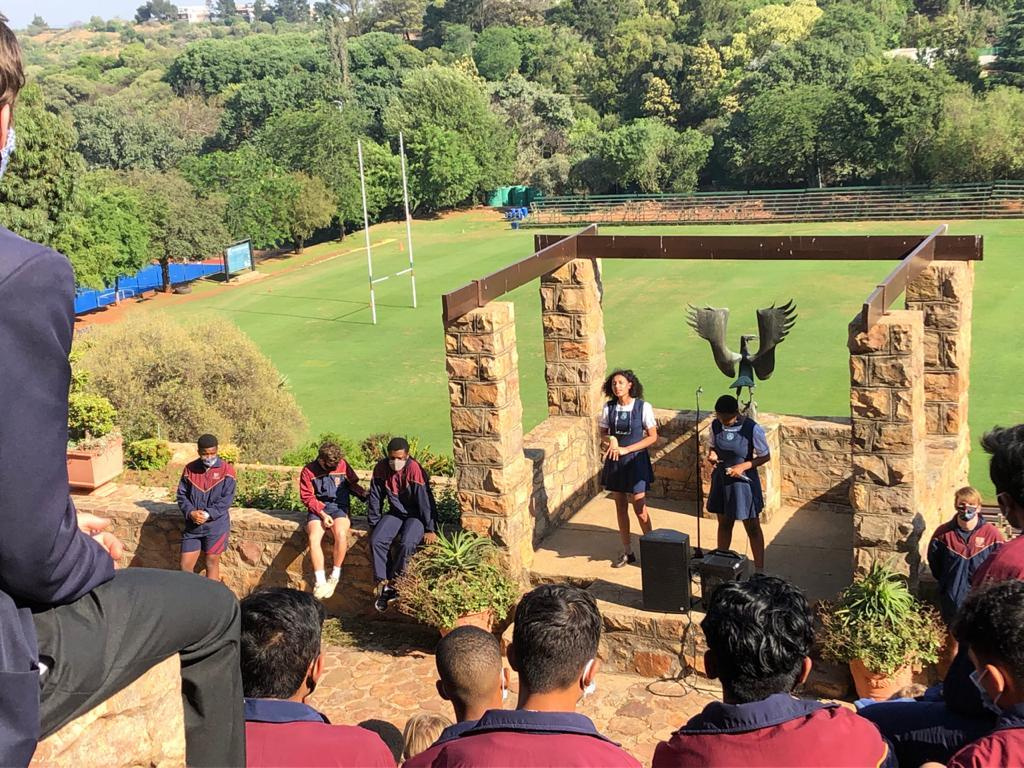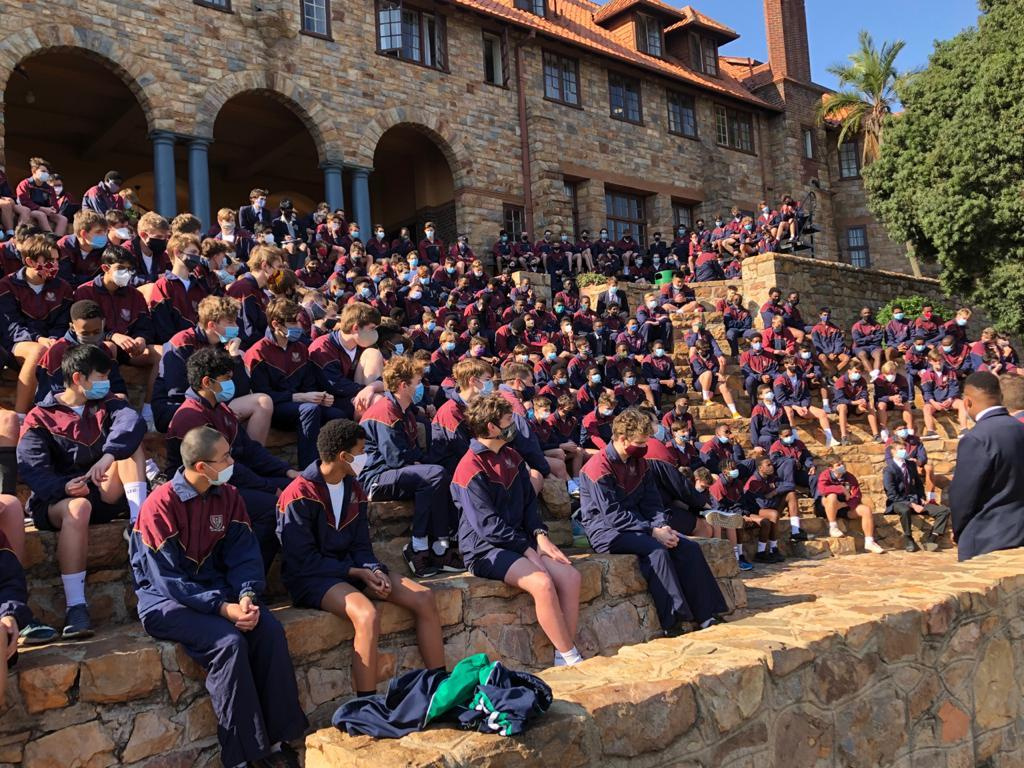International Day of the Girl Child, a day that focuses attention on the need to address the challenges girls face, the promotion of girl empowerment, the fulfilment of the human rights of girls and collective action for a more equitable and prosperous future for women, took place on 11 October.
The theme this year was My Voice, Our Equal Future and St John’s College seized this opportunity to be inspired by what our peers at girls’ schools have identified as the change they want and the solutions that they are leading and seeking within our common communities.
The week that followed featured a series of interactions arranged by the new School Prefects where students from Roedean and St Mary’s School were hosted. The topics and content raised by these young women were hard-hitting and challenging. The talks focused on an awareness of the issues underpinning gender-based violence in South Africa and the importance of allyship and the ability of young men to position themselves to become part of the solution.
The week was rounded off with a special assembly for the junior boys where senior students and female staff reflected on the talks, and offered practical tools for our boys to move forward in partnership.
Sazi Bongwe, Head of School
Our understanding of the world is shaped by the voices we listen to, but it’s also shaped by the voices we don’t listen to. This week we focused on the latter because we need to do a better job of listening to the voices of women. When we amplify those voices and those stories, when we listen with openness and empathy, we allow ourselves to be moved toward allyship, toward painting a better picture of what it means to be a man, and toward justice.
In saying that, we cannot and we must not exclude our voices from those conversations - because they are needed. Your voice is valuable and your perspective matters. One of the words that rang in our ears the most these past few days is accountability. How do we hold ourselves accountable to being part of the solutions? We hold ourselves accountable by being allies in the truest sense of the word. By committing to a constant process of actions. We cannot undo the countless instances of trauma and painful experiences that women bear with them every day. But we must turn to things that we can do. Speaking up is one of them. We can deconstruct toxic norms by speaking out against them at their root causes, here in our own conversations, and that’s what you’ve been tasked to do. Use your voice.
Alex Sittmann, Second Prefect
The main thought of the talks was to encourage conversation and feedback. “What can we do?” you ask. The short answer is change. Change and become a partner in advocating for women’s rights. We have to change, for our own futures and for the women in our lives. So I challenge you to Rethink, Reform, Results:
· rethink your opinions and thinking constantly
· reform your action and behaviours
· get results by tangible activism
Ms Anné du Plessis
In his book for young adults, Stamped: Racism, Antiracism and you, Jason Reynolds explores the origin of racism in America. There were to aspects in this book that struck a chord with me.
He spoke about parallel narratives in the history of America. There is the history we learn in school and with which we are comfortable and then the less heard narrative - that of the slaves. Both narratives are there, but one is amplified because of a system that is supporting it. Both narratives are there but not heard equally.
He, like Dr John Kani in his Hugh Lewin lecture this year, is adamant that we need new codes, new words, new names – that we need a new language with which to engage an antiracist future and society. Instead of “us” and “them” there should be “we”
This can also be translated into the conversations we had around ‘The International Day of the Girl Child’ and it is quite apt that the theme this year is ‘My Voice, Our Equal Future’. Are we hearing gender stories equally? Is the language we use conducive to highlight the plight, the inequities, the strengths, the weaknesses, the frustration and the heartache of a society that is still unequal in the way in which it treats and views over half of its population: women.
We need a new language, a new way in which we can express ourselves, talk to each other, essentially understand each other and write a new narrative - an equal narrative. In essence it sees a future together (our future) but you have to hear “my voice” - the voice of the girl child, the voice of those who speak out, those who have an important narrative. Until we can listen and understand and give equal weight to the narratives, the possibility to have an equal future is slim. We need new language, new words that unify equally instead of divide. Larry Wall said: “You can’t change the past. You can’t even change the future, in the sense that you can only change the present one moment at a time, stubbornly, until the future unwinds itself into the stories of our lives.”
Mrs Jeanne Trichet
I arrived to the talks on Tuesday and Thursday with four hats: the hat of a woman, the hat of a mother of two teenage girls, the hat of an exploration geophysicist who worked in a male dominated environment for over two decades, and the hat of a teacher.
When I heard the young women speak, I related directly to what they were saying. Their mission was to get your attention as young men: to make you stop and think about how our South African society treats its girls and women. If we are to judge our society by that yardstick, we can only conclude that it is broken – it is a deeply damaged society. Then, the young women went on to speak about the trending movement #Men_are_TRASH. Three words and a full stop. Men Are Trash.
Hmm. Trash. That word sticks in my throat and I realise it is meant to stick in all our throats. There is no redemption there. There is no qualification. With my hat as a mother I find that hashtag very problematic – it does not pass the human dignity test. No-one can experience the birth of a child and relate that child to the word “trash”.
Yet every day, I fear for my girl’s safety because they are girls. At the same time, I look at you as a teacher and I love working with you: you exude positive energy, curiosity, strength, kindness, warmth and humour. I see so much that is positive inside of you, and it is a joy to help guide you through five years at the College. Do I believe that you can behave in a trashy way towards women? You bet; I do! Are you as an individual, trash? No. You most certainly are not. So, I needed help in unpacking the language of #Men_are_Trash.
Conversations with our Thomson tutor families and with Mr Allan Magubane helped me reframe this hashtag. Women in our country are undeniably under attack. We are literally at war with the male perpetrators of violence, discrimination, and degradation and when at war, we do not have the liberty of asking who we can, and who we cannot trust. The stakes are too high, and we do not want to face one more gender-based attack. Does that make you, as an individual trash? No. It makes the threat “trash” – and you, as young men, have the power to do something about that threat.
Mrs Tracy Edwards
After the discussions with the St Mary’s girls, the UIV Nash group had a really productive conversation as while we shared our personal stories and asked each other questions, we were also pragmatic and came up with a way forward. It is therefore my privilege to share our collective Toolkit with you:
CHECK YOUR LANGUAGE: Move away from possessive words like “our” and “my” and let’s talk about “the girls” and “the women” and the fight that “we” are in together. Let’s avoid polarising and taking sides: at the end of the day we are all working towards the same goal.
ASK: Chivalry is consensual. Ask a girl, a woman, a female if they need assistance, if they want to go through the door first, what you can do to make them feel comfortable. Ask if they want to talk or if they want your assistance and if they say “no” then you have to respect that.
LISTEN: It’s so easy to become defensive. Listen to what women and girls have to say and realise it is not about you but about a number of other men in her life who have hurt, offended, attacked her in some way.
TALK: Start a dialogue with those around you: both girls and boys. Male allies can explain their desire to be of assistance, their desire to protect and help. Remember consent though.
ACT: Rethink your behaviour and opinions constantly. Walk away from a group or WhatsApp group that are making problematic/offensive jokes. Don’t follow that IG influencer or TikToker who makes offensive videos that promote sexism – or really any of the isms. Reform your thinking, and then your behaviours and actions.



